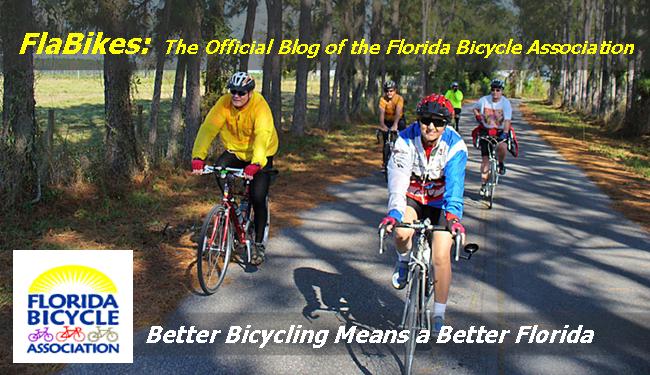ADVOCATE ATTORNEYS VS. FDOT HAVE THEIR DAY IN COURT
The continuing saga of the A1A issue in Palm Beach County hit a high note Tuesday in Tallahassee when attorney advocates had their day in court. Before or after you read pro bono attorney and FBA member Jeff Lynne's summary, visit
this link to the video from the hearing, then go to:
07-1373 01-29-08 BRUCE ROSENZWEIG, BOCA BICYCLE CLUB, ET AL. v. DEPT. OF TRANSPORTATION, ET A
BRIEF SYNOPSIS:It became apparent during the hearing that the court did not agree either with FDOT's interpretation of §335.065, Fla. Stat., or FDOT's assertion that we do not have "standing" to challenge their failure to follow the law. The court did have some concerns as to the procedural irregularity of the hearing below, and questioned whether we sufficiently preserved the issue for appeal, but we were able to provide the court with a case on point after the hearing which we believe should alleviate those concerns. We remain cautiously optimistic based upon our collective impressions of how the hearing transpired, and hope for the best.
If the court is to rule in our favor, we believe that the opinion and order would provide, in whole or in part, that:
(1) There is a statutory presumption under §335.065, Florida Statutes, that bike lanes are to be included in all resurfacing projects, unless a legally recognized statutory or regulatory exception exists;
(2) FDOT has the burden of establishing and memorializing that such an exception exists and documenting same;
(3) There are persons with substantial interests in the provisions of bicycle lanes which gives them the right (i.e., standing) to challenge FDOT's failure to meet its burden of establishing and memorializing that such an exception exists; and
(4) FDOT must re-examine the A1A Project and determine where it cannot place 4-5 foot bike lanes and submit "Design Exception/Variance" documents stating the reason for not doing so [at which time persons can challenge FDOT's factual conclusions as to available right of way, cost, etc.].
Even if FDOT comes back and says they are not putting in standard-width bike lanes because of "A, B and C", at least those grounds will be based upon exceptions lawfully recognized. For instance, if drainage is an issue (and if we don't dispute that fact), then bike lanes can be limited in scope. However, if the Town of Ocean Ridge doesn't like bike lanes, that's not going to cut it.
However, the court could also rule that the procedural irregularity which occurred was fatal to our cause and not even address the core legal issue on bike lanes. But we feel that is unlikely considering the time allowed and the interest expressed by the panel.
LONGER VERSION:
The concern you heard the court express during the hearing is a nuance regarding the procedural aspects of the administrative hearing below. There is no short way to explain this, but I will try (as a lawyer, that's hard to do!).
Under the statutory procedures established by the Florida Legislature to challenge decisions from administrative agencies such as FDOT, if the dispute includes a need to determine facts (such as how much something costs), the agency (FDOT) is required to refer the matter to an impartial third-party (the Department of Administrative Hearings or "DOAH") to conduct a "formal" hearing, with testimony, etc., to make a determination of what the "facts" actually are.
On the other hand, if the dispute is not about facts, but only the application of rules or laws to agreed-upon facts, the agency can proceed "informally" (which is what occurred here) and set the matter before a "hearing officer" of its choosing (in this instance, FDOT's Chief Engineer).
However, if during that informal hearing, it becomes apparent that there is a dispute as to facts, we believe the agency is obligated, under rule, to stop the hearing and transfer the matter to DOAH to conduct the formal hearing we described above.
The questions posed by the court were:
(1) Whether FDOT, by setting our matter for an "informal" hearing, implicitly agreed to the facts we alleged in our complaint?
(2) Once (and if) it became apparent during the informal hearing that FDOT was relying upon facts that we otherwise disputed in our complaint (such as, we asserted in our complaint that the cost of building the bike lanes did not outweigh the need), who has the burden of suspending the hearing and requesting a formal hearing, us or FDOT? If it is us, and if FDOT then places those otherwise disputed facts into the Final Order, are we then stuck with those findings of fact?
In response, we were able to identify (after the hearing) a case which appears to be almost directly on point, which concludes that a party cannot "waive" the right to a formal hearing, notwithstanding that it became apparent during an informal hearing that there was a factual dispute. We were able to file a copy of that case with the court for its review during its deliberations on the matter.
And now we just wait....
Thanks to all the attorneys, Boca Raton Bicycle Club and the League of American Bicyclists for their tremendous support of this issue. FBA is behind this matter all the way.
